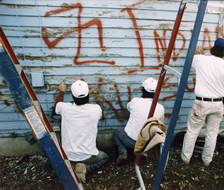Smithsonian Encourages Dialogue on Positive Social Change with Educators across the Nation through Poster Set and Online Resources
“Never doubt that a small group of thoughtful committed citizens can change the world.
Indeed, it is the only thing that ever has.”
– Margaret Mead (1901-1978), anthropologist
The Smithsonian Institution Traveling Exhibition Service (SITES) has joined the educational organization Facing History and Ourselves to dramatically increase access to the themes and content in its national initiative “Choosing to Participate” with a set of 11 posters designed to encourage dialogue, engagement, respect and participation in classrooms and communities.
Developed for middle-school and high-school students, the posters are intended to inspire people of all ages to create positive social change. The posters present the experiences of individuals and communities, explore the history and impact of racism and prejudice and encourage viewers to consider the consequences of everyday choices—to discover how “little things are big”—and to make a difference in their own communities.
The graphically compelling colorful posters are being distributed at no cost to schools, libraries, museums and community organizations through partnerships, including the Boys & Girls Clubs of America and the American Library Association.
The “Choosing to Participate” website—https://www.sites.si.edu/s/topic/0TO36000000L8FHGA0/choosing-to-participate—features a host of resources, including downloadable files of each poster and links to various educational resources for teachers, families and communities.
Founded in 1976, Facing History and Ourselves is an international educational and professional development nonprofit organization whose mission is to engage students of diverse backgrounds in an examination of racism, prejudice and antisemitism in order to promote the development of a more humane and informed citizenry. By studying the historical development of the Holocaust and other examples of genocide, students make the essential connection between history and the moral choices they confront in their own lives. For more information, visit www.facinghistory.org.
SITES has been sharing the wealth of Smithsonian collections and research programs with millions of people outside Washington, D.C., for nearly 60 years. SITES connects Americans to their shared cultural heritage through a wide range of exhibitions about art, science and history, which are shown wherever people live, work and play. For exhibition descriptions and tour schedules, visit www.sites.si.edu.
# # #
SI-444-2010
Jennifer Schommer
202-633-3121

